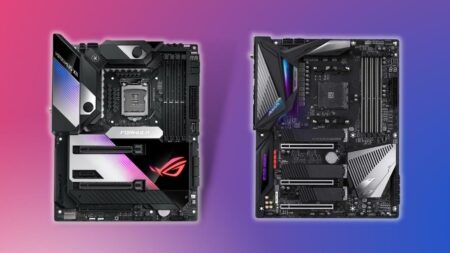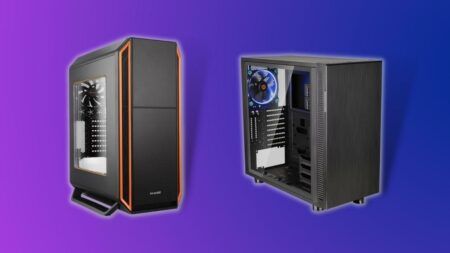Are you looking for a small PC case to use in your home or office?
If so, you have come to the right place! In this blog post, we will discuss five of the smallest PC cases on the market today.
These cases are perfect for people who want a smaller form factor without having to sacrifice performance.
So, what are you waiting for? Read on to learn more about these amazing cases!
What Are The Smallest PC Cases?
Below, you will find a list of the top 6 smallest PC cases currently available.
These cases are perfect for people who want to save space without sacrificing performance.
1. Lian Li O11 Air Mini
The Lian Li O11 Air Mini is one of the most compact cases that support either an ATX motherboard or a Micro-ATX.
The modular rear panel allows you to customize your installation according to your current hardware needs. This case uses a dual-chamber design in order to save height, with the PSU and up to six SATA drives in the other chamber.
Up to four 3.5″ HDDs can be installed for maximum storage capacity.
2. NCASE M1
The NCASE M1 is one of the most popular small cases on the market, and for good reason!
This case can accommodate an ATX motherboard, a full-length graphics card, and a water cooling radiator.
The modular design allows you to mix and match your components in order to create the perfect configuration for your needs.
3. Thermaltake Core V21
Not only does this case look like a cube, but it functions like one too. Its main body can be attached to the bottom panel in any orientation. For example, if you have a graphics card, the default orientation with the motherboard mounted horizontally will provide better weight distribution (and there’s also a removable filter for the PSU).
However, if you don’t have a graphics card, you may want to rotate the main body 90 degrees so that both the PSU and CPU cooler is situated near the bottom. This will provide better airflow to the motherboard and drives.
The Core V21 can accommodate an ATX motherboard, a full-length graphics card, and a 240mm radiator.
4. Sama IM01
The case comes with an 80mm rear fan, but you can add another one for a total of two. You can also add three 120 mm fans: 1 on top and 2 at the bottom. The bottom spots can also be used for SATA drives, and another SSD drive can be installed behind the PSU if desired.
5. Antec ISK600M
The Antec ISK600M can accommodate a micro-ATX motherboard, a full-length graphics card, and a 120mm radiator. This case also has two drive bays: one for an SSD and one for a 3.5″ HDD.
6. InWin A1 Plus
The InWin A1 Plus is one of the most unique cases on this list. This case comes with an integrated 650W PSU. It also has a built-in OLED display that shows real-time information about your systems, such as temperature and fan speed. This case can accommodate an ATX motherboard and a full-length graphics card.
The A1 Plus’ square structure and Mini-ITX form enable a much simpler installation process while still having the ability to support more powerful hardware. The case is able to house CPU heatsinks up to 160mm tall and Graphics cards up to 320mm long.
What Are The Advantages Of Small PC Cases?
Small PC cases have a number of advantages over their larger counterparts. One of the biggest advantages is that they are much easier to transport. If you are frequently taking your system to LAN parties or other events, then a small case will make it much easier to carry around.
Another advantage of small cases is that they often have better airflow than larger cases. This is because there is less space for the air to get trapped and heated up. This can be a big advantage if you are using a powerful system, as it will help keep your components cool and prevent them from overheating.
Finally, small cases often look much more sleek and elegant than their larger counterparts. If you are looking for a case that will make your system look its best, then you should definitely consider a small form factor case.
What Are The Disadvantages Of Small PC Cases?
One of the biggest disadvantages of small PC cases is that they often have less space for expansion. If you are planning on adding more drives or upgrading your graphics card in the future, then you may want to consider a larger case.
Another disadvantage of small cases is that they often have less room for cable management. This can make it more difficult to keep your system tidy and organized.
How To Choose The Right PC Case For Me?
Now that you have seen some of the smallest PC cases on the market, it is time to choose the right one for you. In order to do this, you will need to consider a few factors, such as the size of your motherboard, the number of drives you need to install, and your budget.
If you are looking for a small case that can still accommodate a powerful system, then you will want to focus on cases that support an ATX motherboard and have plenty of drive bays.
If you are on a tight budget, then you may want to consider a Micro-ATX case.




